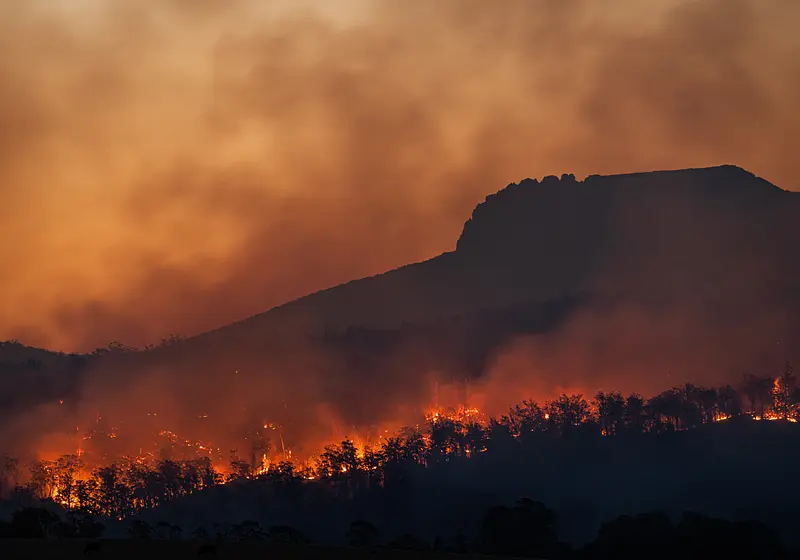“THE EARTH IS BURNING?!”
This is the typical question that crosses the average human’s mind when discussing the Earth’s increasing surface temperatures and its prevalent heatwaves. To be frank, it is impossible to turn on a modern news station without hearing the urgent cries of climate change activists and the less-than-fortunate people it often affects. At that moment, though, it isn’t atypical for viewers to turn off the television and walk away, and to pretend that it doesn’t affect them solely because of who they are.
Or maybe the viewer is an intermittent empath and does feel pain and worry for those that will die at the hands of climate change. At that moment, perhaps they cry and wail like babies when they get wind of the immediate danger that faces all human life. And then, something might catch their eye or distract their mind.
Something that they hold in a higher regard or deem more interesting. And despite the empathy they once had, they go right back to where they started: indifferent.
While China is breaking temperature records with heat reaching 113 degree Fahrenheit, most people are sleeping peacefully in their beds, ignoring the crisis that affects humans worldwide. And, while nearly 1,600 people in America die of heat exhaustion, most people are eating, relaxing, and giving attention to things that share no relation to the future of the planet.
Most activists and advocates would rush to educate their listeners about this climate emergency. I, however, believe that it’s best to approach this topic in chunks. Like a meal, you can’t digest a crisis in one bite. I’d specifically like to shine some light on the beast that is heatwaves.
Let us slide into your dms 🥰
Get notified of top trending articles like this one every week! (we won't spam you)What are Heatwaves?
According to the NOAA, “a heat wave is a period of unusually hot weather that typically lasts two or more days.” A heat wave is a product of a high-pressure system pushing air downward. This force limits the amount of air closest to the ground from rising while the hot air just sits there. Think of it like a pie sitting in the oven for hours. For the first hour or two, it smells nice and makes your mouth water like Pavlov’s dog; but if you leave it in for too long, it gets burnt.
This is the same thing as a heatwave. When you’re outside playing in the scintillating sun, it feels nice, initially, to have the heat massaging your back. Then, after a few hours of playing tag or hopscotch, you start to get burned.
I say burned in both the literal sense and in the metaphorical sense. You can get a sunburn from the star above your head, but you can also get burned in the long term.
The list of harmful impacts heatwaves cause is nearly endless. Heatwaves increase the likelihood of droughts, wildfires, and other natural disasters. Not to mention the way it affects human health.
According to the Center for Climate Change and Energy Solutions, heatwaves can cause heat stress and heat-related illnesses and mortality. Nearly 600 people have died of heatwaves just this year.
Take the Quiz: Which Indian city is the perfect holiday spot for you!?
Let's match you with an Indian city that you would love!
The Impact
Heatwaves are also detrimental to the commercial and economic industries. In agriculture, heatwaves can increase livestock deaths, lower cattle reproduction rates, and increase the chances of a decline in milk production. Heatwaves are also horrible for the growth of crops.
Recently, a tragedy occurred in western Europe where nearly 7,000 hectares of farmland were consumed in a blaze created by heatwaves. It required over 1,000 firefighters to extinguish, and many civilians lost their homes at the hands of an uncontrollable climate disaster.
According to the University of Chicago, it is expected that the United States’ economy could lose between 1 to 4 percent of GDP because of the forthcoming climate scenario. This, in turn, leads to a loss of jobs, a drop in livelihood security, and an increase in food insecurity.
The worst part about this entire crisis, though, isn’t the fact that it is occurring. Instead, it is the fact that heat waves are becoming the norm. WeForum.org elaborates on this, stating, “The way we define the concurrent heat wave is there are any two regions in the mid-latitudes that are simultaneously experiencing large heat waves.” And that this occurs “almost every day in the summer season.” The same article discussed the slow yet obvious progression of heatwave expansion internationally.
In the 1980s, heat waves only occurred for 20-30 days each summer. Now the occurrence of heatwaves is 6 times as likely and covers about 46% more space than 40 years ago.
Conservation: What can be done?
However, it’s never too late to take action. Being conscious of greenhouse gases and efficient energy sources is a good start to the journey that is environmental conservation. Planting vegetation is a great way to lower surface temperatures and reduce the likelihood of the formation of heatwaves.
But most importantly, reach out! Communicating with nonprofits devoted to environmental conservation such as 350.org, the Environmental Defense Fund, and ClimateWorks are great ways to find opportunities to make a difference and shine some light on what could be a very gloomy future.
The generations that are soon to come may never remember their forefathers, but they will remember the impact their forefathers’ actions had on their quality of life, and it is imperative to stay educated. It is important to be vigilant and intentional about everything you do, because every decision made regarding the environment affects our future as well as the present.









